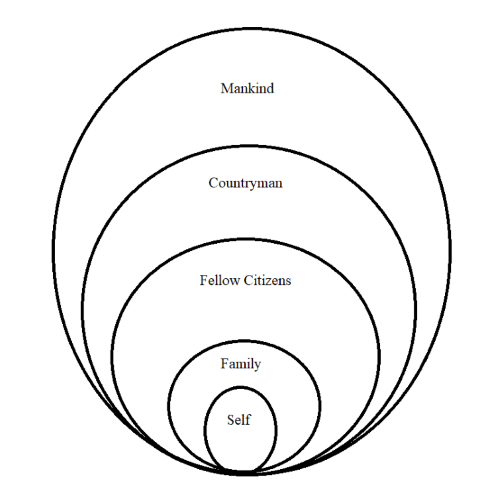
Meditating on reversing roles can help you to understand others on a more rational and emotional basis. We are all connected and in need of each other, but we can strengthen our connection with others by following this meditation.
In Stoic philosophy, role reversal can be understood in relation to cosmopolitanism. According to Stoics, all people are connected in some way, and one of the qualities of a reasonable being is to live with one another. Humans are naturally social beings and we are born to live in society, not to shy away from it.
Role reversal is a mindful activity that enables us to step into someone else’s shoes and to understand the other person’s perspective or experiences. How many times were you able to feel the joy or sadness of another? Chances are you have felt this countless times, whether it was someone in your own life or simply an actor in a TV show. That is because we all share a common bond that is intertwined through our lives.
Stoics believe that humans are part of a greater whole. Every life is important and precious, because it reflects the eternal nature of the universe. Furthermore, our nature is not complete if we are separated from others. Only together can we form a bond that enables us to discover the importance of our own lives.
Hierocles, a late Stoic philosopher, pondered about the cosmopolitan nature of the human mind. He discovered that the interconnection of individuals can be described with a series of circles, seen below.

The first and smallest circle represents the human mind. After that is your immediate and extended family, as well as your friends. Next comes your local community: your neighbors, coworkers, your hairdresser, the postman, etc. That is followed by the community of neighboring towns and then your country. Finally, the last circle is the entire human race.
Naturally, we are most familiar and kindest to the people towards the center of our circles. However, our task is to extend that same familiarity to the people at the edges of our circle; only this way can we achieve cosmopolitanism and a true universal bond throughout humanity.
In order to aim for this milestone, we must first participate in the Stoics’ reverse roles activity. Our second task is to simply listen to other people, and pay attention to their words and emotions. The Roman Emperor and Stoic philosopher Marcus Aurelius offers an example of what successful conduct looks like:
“In conversation, one should attend closely to what is being said, and with regard to every impulse attend to what arises from it; in the latter case, to see from the first what end it has in view, and in the former, to keep careful watch on what people are meaning to say”
Marcus Aurelius
Following the principles of cosmopolitanism, the more connected we are with people, the better our understanding will be of their thoughts, needs, troubles, problems, etc. Therefore, the benefits of reversing roles grows in proportion if we include all humans under one principle.
Meditation – Reverse Roles
The purpose of this meditation is to bring you closer to other people, whether it is someone in your local community or someone halfway across the world on the news. Empathy is a highly valuable quality that we as social beings all possess, and it should be practiced.
Imagine a situation where nobody can understand you and you desperately need help in some form. Everyone is just staring at you, unable to detect your suffering or purposefully avoidant of it. You are struggling and yelling, but nobody comes to your aid. Now, think about all the times you act in the exact same way in response to other people or groups. Those people who are part of marginalized groups, or people with mental disorders, or who live in undeveloped countries, or so on. Put yourself in their shoes and notice how it feels to be ignored, avoided, or outright silenced. Ask yourself, how would I feel about the world?
As Marcus Aurelius noticed, people sometimes say things in a “not very proper way”. It is up to us to not take offence by misspoken words and to seize the meaning they intended. What is needed in this instance is to address the meaning behind their words, not the words themselves. We need to use reason and remain calm; afterall, our minds should be used to bring us closer together, not to seek reasons to isolate others.
Even when you feel alone, there is always someone to talk to, even if that person is currently a stranger. Try to express your feelings and thoughts in the best possible way; describe how you feel and then describe your thoughts on those feelings. Only by sharing our thoughts and emotions can we find a solution to our problems.
On the other hand, if someone comes to you with their own problems, you should focus your attention on their behavior, words and expressions. Try to connect with them on an emotional basis and you will be able to step into that person’s experience. Mutual understanding and compassion is crucial for the betterment of ourselves and humanity. We all need each other in order to grow, otherwise we will forever remain where we are.










